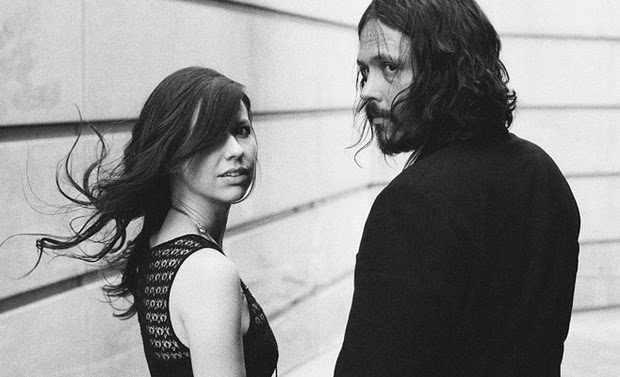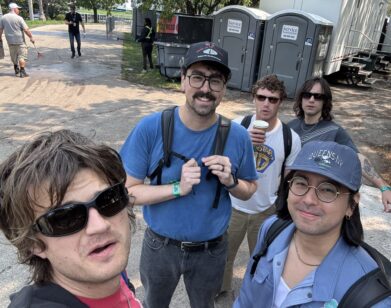The Civil Wars Form a Perfect Union

THE CIVIL WARS
The first thing you should know about Joy Williams and John Paul White, better known as The Civil Wars, is that they’re not a couple. The duo, who were both happily married well before they met at a Nashville songwriting session in 2008, do banter playfully in conversation, but it’s more the sarcastic-sweet ribbings of a brother-sister bond than the stuff of tension-soaked romance novels.
The music, on the other hand, is a different story. The band’s debut, Barton Hollow, is filled with hushed conversations between lovers, lyrical forget-me-nots, and the kind of sparse arrangements that beg to be played in dim lighting. It’s an impressive debut, to be sure, and a surprising pairing considering Williams is a former contemporary Christian artist and White a self-described whiskey drinker from Alabama who was raised on Southern rock and Johnny Cash.
Curious as to how these seemingly polar opposites came to produce such harmonious tunes, we caught up with The Civil Wars as they prepared for an appearance on The Late Show with David Letterman.
JEFF OLOIZIA: You’re playing a couple of shows over the weekend. Any plans to perform in costume?
JOY WILLIAMS: [laughs] We already do!
JOHN PAUL WHITE: In costume? It depends on how you look at it. That’s pretty much what we do with donning the suit and bow tie and little black dress; we kind of step into character any time we do that.
WILLIAMS: Maybe we should switch.
WHITE: I’ll wear the dress. [laughs] Honestly, I’m going to be flying home for Halloween. I’ll watch the kids trick or treat, and then fly straight back to Toronto. So no rest for Dad.
OLOIZIA: I understand you were both dealing with some vocal issues recently. Is everything all better now?
WHITE: Yeah, we’re pretty much back to normal. We’ve still got some taking care of ourselves to do, but we luckily both kind of ran down at the same time, so the hiatus worked out for both of us. We’re probably doing a little bit better job of taking care of ourselves now.
OLOIZIA: No wild nights in New York, then?
WHITE: No, sadly, this will be the tamest trip to New York we’ve ever made.
OLOIZIA: [laughs] Do you feel like it puts additional strain on you because it’s just the two of you onstage every night?
WILLIAMS: I don’t know if I would say that it puts a strain on us. I love the fact that it’s just the two of us onstage. It requires over 100% from both of us, and to do that night after night—it’s something that we love to do, but it also takes a bit of a toll. It’s just the nature of touring; it’s always an experiment in learning how to pace yourself. And we love working hard, but, you know, we’re not bionic, so every once in a while we have to recalibrate and heal up a little bit and figure out how to do it a little better next time.
OLOIZIA: I think your music lends itself to that kind of intimate experience.
WHITE: Well, thank you. That’s where it grew from in the beginning, just [Joy] and I on guitar writing all these songs. So once we went out and played them, you know, financially it made the most sense. And since they were created that way, they kind of translated live the same way. By the time we went into the studio to record them, we pretty much had the arrangements down the way we wanted, and when we’d add other instrumentation, most things that we added would just get in the way. It ended up being a really minimal record, without us really intending to do that. It just kind of worked out that way.
OLOIZIA: Do you think that’s something will continue as you guys continue to tour and you get a little leeway in your budget?
WHITE: I think, luckily, at the moment, we’re not held back financially to do it anymore. It’s just totally our choice. But we’ve said many times, we’re not going to draw a line in the sand about whether it’s just us two or not. We’re just going to follow our nose, as we have so far. If it feels like the rooms are getting big enough that we need a little bit extra, then so be it. But at the moment it’s working well, and we love being able to control every bit of sound that comes off the stage. It gives you a lot of power.
OLOIZIA: That makes a lot of sense. I think expanding your band can really enhance your sound, but I also remember watching Guns N’ Roses in the ’90s after they had sort of blown up, and they had a horn section and backup singers, and you kind of think, “I’m not sure how rock-‘n’-roll this is anymore.”
WILLIAMS: Yeah, we thought about that. We thought about incorporating Spandex, and backup dancers and maybe a little pyrotechnics, but it seemed a little early in the career. John Paul prefers the spandex now, but underneath. [laughs]
OLOIZIA: Your career as a duo has been full of these sort of matchstick moments, perhaps none bigger than “Poison and Wine” appearing on Grey’s Anatomy. Did you have a pretty good idea of what that might do for you?
WILLIAMS: No, I don’t think we had any concept of the magnitude of that placement. We were shocked and flabbergasted when we got the call that it was even being placed. Truth is, we didn’t even have the song up on iTunes, nor did we have a music video. So we scrambled within a week’s time to get everything squared away, and when it played on the show, it was a very surreal moment. I think one thing that was also helpful with creating a little bit of a ripple effect, was the fact that we put out a live record, Live at Eddie’s Attic, which we gave out for free. So by the time “Poison and Wine” got placed on Grey’s, people could Google the lyric, “I don’t love you, but I always will,” and our song would pop up. I’m thankful for the fact that there have been breadcrumb moments along the way, on top of the big matchstick moments that you just mentioned. Everything felt like small hinges on a very large door that we just continue to pry open one day at a time.
OLOIZIA: I’m glad you brought up that line from the song, because it’s something that I think really stays with you. Can you expound on that a little bit more—where that lyric came from and what it means to you?
WHITE: Well, we wrote the song back in Nashville with a good friend of ours, Chris Lindsey, and it’s the only song that we had an outside collaborator on. We all sat over the course of the day and talked about—you know, we’ve all been married to other people for a decent amount of time and know the good, the band, and the ugly. And we talked about those things, and the compromise that it takes, and how there are times you want to hold somebody and there’s time that you want to strangle them. And it’s perfectly human and it’s perfectly natural. Those little battles that you have—you can’t just run away from it the first time you have any sort of conflict. It’s just part of what makes the relationship great. So we talked about all those little nooks and crannies of a real relationship, and we ultimately started noticing all the little contradictions that seem to go with [them]. It’s a song we’re always going to hold high, because it was, for a lot of people, the first thing they heard from us.
OLOIZIA: You mentioned the fact that you’re both married. Because of how personal the experience of making music with someone else can be, did either of you have any second thoughts about getting together?
WHITE: Honestly, what crossed our mind more than that was, “Did either one of us even want to be artists anymore?” We’d had long conversations about not being happy in the solo field—we didn’t have a whole lot of good things to say about it. And not necessarily damning major labels, but we didn’t have a great experience with that, and you know, weren’t entirely happy with the music we were making. So my initial hesitation was more along the lines of, one, do I even want to do this anymore? Two, do I want to convince someone else to hitch their wagon to me? And then, three, is she even into it? Because we hadn’t had that conversation. I had the conversation with my wife before even talking to Joy, and once I talked to Joy about it, we all had a big family meeting and never looked back since.
WILLIAMS: After our first co-write, I remember driving home and opening the door to the house and talking to my husband and saying, “I met this guy.” [laughs] That’s not really what most husbands want to hear. But the reality of it is that my amazing husband is also the band’s manager, and so we’re able to keep things more in balance, and we all made a decision from the very beginning that we wanted this to be a family and a community. We seem to be doing that.
OLOIZIA: It’s an interesting pairing. You both come from fairly different backgrounds, musically.
WILLIAMS: Oh, yes. [laughs]
OLOIZIA: Does either of you ever wish you could bring more of your own influences into the music?
WILLIAMS: Honestly no, because the reality is, I think we actually do. John Paul obviously comes from more of a folk, country, and Americana background. He grew up listening to a lot of metal, and, you know, he listened to top 40 as well. And I grew up in Northern California listening to a lot of pop music, a lot of oldies, a lot of jazz, and even rap. So I think that the blending seems to work for us. That’s probably why we cover everything from Leonard Cohen to Michael Jackson in a set. We don’t feel like it has to stay within specific sonic parameters. I think we love drumming that out of each other, and hopefully that makes the yin and yang of the Civil Wars.
BARTON HOLLOW IS OUT NOW. THE CIVIL WARS PLAY AT TOWN HALL TONIGHT. FOR MORE ON THE BAND, VISIT THEIR WEBSITE.






